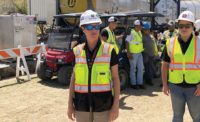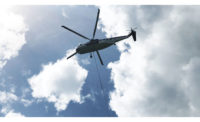A small, Montana-based energy company that won a $300-million contract to help restore power to Puerto Rico is facing scrutiny because, among other things, it is based in Whitefish, Mont., the home of Interior Secretary Ryan Zinke. A spokesman for the company, though, says the contract was entered into without any involvement from federal officials.
“The Interior Dept. would have no reason to be involved and no Interior Dept. officials were consulted,” says Chris Chiames, a spokesman for Whitefish.
The response came after several media reports, including a story in the Washington Post pointed out that the company is in Zinke’s hometown.
After the Washington Post story, Sen. Maria Cantwell, (D-Wash.), ranking member of the Senate Energy and Natural Resources Committee, called on the Government Accountability office to investigate the contract. Rep. Rob Bishop (R-Utah) chairman of the House Natural Resources Panel, which oversees Puerto Rico, said he is seeking more information about the contract.
The Puerto Rican government tweeted Tuesday the contract would be audited to make sure that it meets Federal Emergency Management Agency standards. Such standards would have to be met if the territory expected to be reimbursed for the work by FEMA.
In a statement, Puerto Rico Gov. Ricardo Rosselló said the contract went to Whitefish because it didn’t need much money up front, something the island’s bankrupt utility couldn’t provide.
According to a leaked copy of the contract, Whitefish received an upfront payment of $3.7 million. The other company wanted $25 million, according to media reports.
Chiames says Whitefish was one of two companies that responded to a request for proposal issued by PREPA to help restore its devastated grid after Hurricane Irma. The Whitefish workload grew after Hurricane Maria. ”We’re a different kind of company, that doesn’t have the overhead of other companies,” Chiames said.
Whitefish has been in Puerto Rico since Sept. 26, with a small management team including CEO Andy Techmanski. The company is coordinating the work of about 300 workers and subcontractors working to rebuild about 100 miles of transmission line in mountainous regions of the island, in some cases using helicopters. Whitefish says it intends to mobilize a total of 1,000 workers in the territory.
The company was founded in 2015 by Techmanski, a former president of Quanta Field Services. Starting as a lineman, Techmanski has worked in the industry since 1995, according to his LinkedIn profile, and has worked in Europe and the Middle East building power lines. The company’s website says it has “decades of experience navigating mountainous terrain and difficult construction scenarios.”
Whitefish is backed by HBC Investments and Flat Creek Capital, both based in Dallas, and Comtrafo Transformers, based in Brazil.
According to a copy of the contract obtained by the Washington Post, Whitefish is charging PREPA $330 per day for a site supervisor, $228 for a “journeyman lineman,” $462 for a subcontracted supervisor and $319 per day for a lineman. The company is also charging PREPA $412 per day for food and board, according to the Post.
Questions have also been raised about why PREPA, which is $9 billion in debt, didn’t turn to mutual aid agreements that public power authorities have with one another. While PREPA didn’t return a request for comment, the American Public Power Association says PREPA, which is a member of APPA, has not asked for such aid from the APPA.
Under the mutual aid agreement, more than 1,100 utilities in network can send workers and equipment to another utility’s territory to help restore power before and after a disaster.
The help, however, is not free. The utility requesting the aid pays the utility preset rates for labor and equipment.
In a mutual aid agreement, PREPA would have to manage the logistics of getting workers and equipment to the island and be responsible for housing and feeding the workers. Under its contract with Whitefish, the Montana company is managing those logistics.
Army Corps Commander Lt. Gen Todd Semonite pointed out in an Oct. 20 press briefing, “Because it is an island and it is very, very hard to just drive hundreds of pole trucks and hundreds of material down into Virgin Islands and down into Puerto Rico.”
The U.S. Virgin Islands did contact the APPA for mutual aid assistance to supplement contract work already underway, according to the association.





Post a comment to this article
Report Abusive Comment